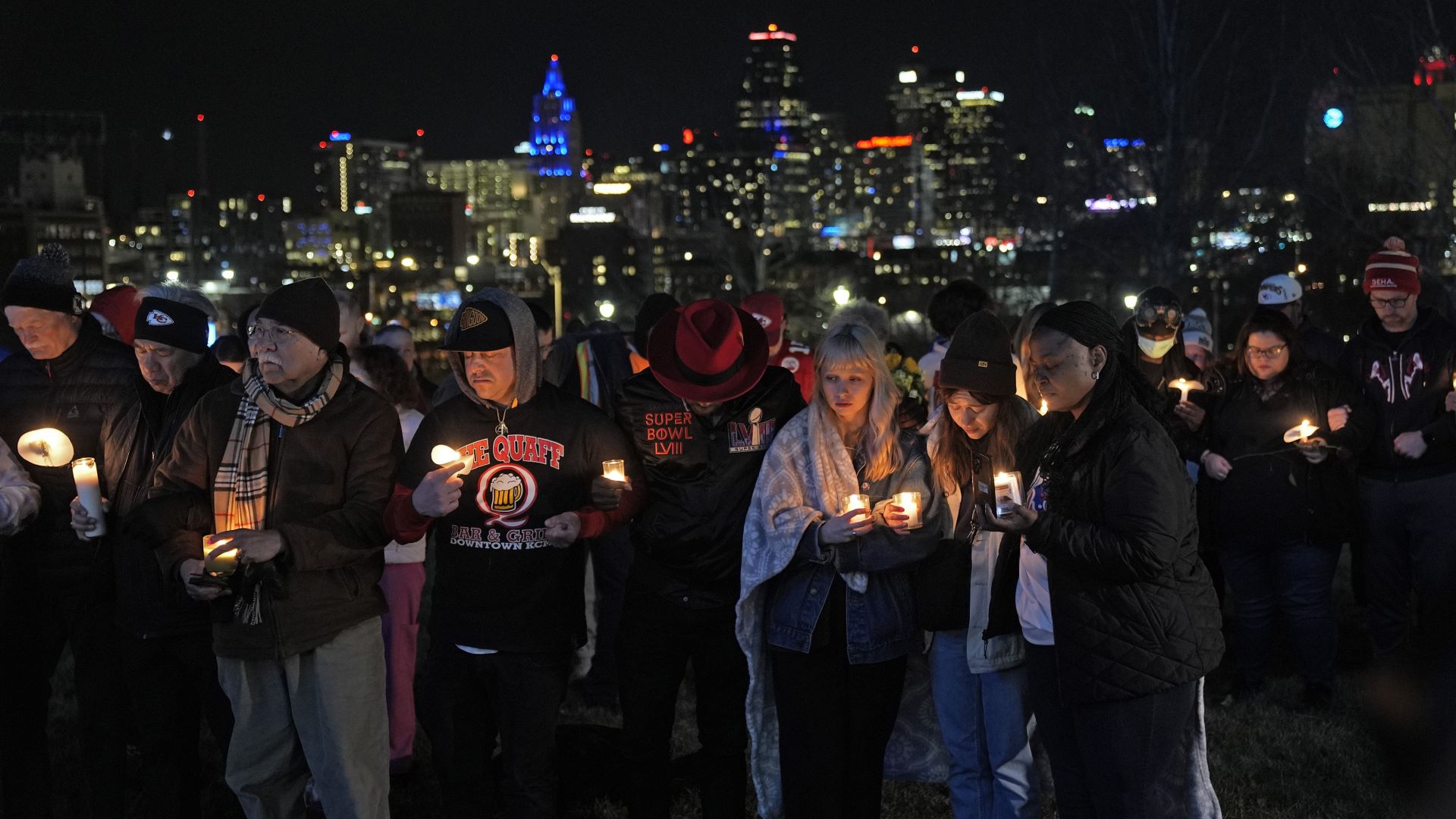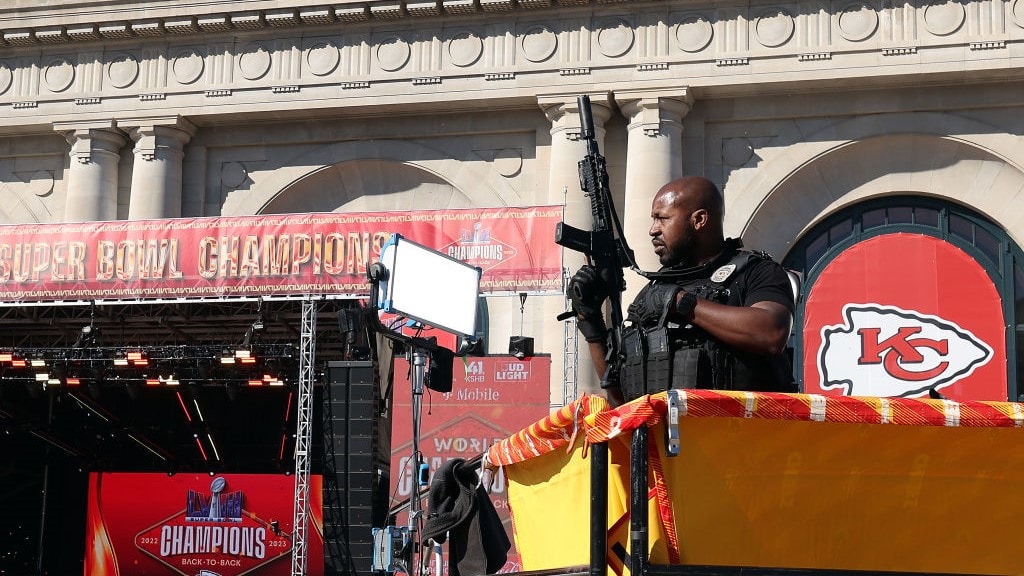Want to Help Reduce Gun Violence? Join These KC Groups Reducing Gun Violence is Not Futile. Kansas City is Uniquely Situated to Help
Published February 21st, 2024 at 6:00 AM
Above image credit: The first of several vigils following the Super Bowl parade mass shooting was held the following day, Feb. 15. People gathered near where some of the young people who were shot were still being treated, at Children's Mercy Kansas City. (Mary Sanchez | Flatland)In grief, fear and anger, Kansas City continues to react.
A week has passed since guns were fired at the conclusion of what should have been a glorious day for Kansas City – a parade to celebrate a Chiefs Super Bowl victory.
In a matter of seconds, a Johnson County woman’s life ended, 22 others were shot and Kansas City was terrorized.
It’s a miracle of millimeters that no one else died.
Initially, two teenagers were charged with gun crimes and resisting arrest. On Tuesday, two adult men were charged with second-degree murder. Lyndell Mays of Raytown and Dominic M. Miller of Kansas City are each being held on a $1 million bond.
It’s a huge step forward in the case – even as Kansas Citians continue to ask why it happened and whether anything could have been done to stop it.
Long-running political and cultural divides immediately resurfaced. Second Amendment advocates faced off against those who emphasize public safety.
Missouri Gov. Mike Parson insists that no gun reform legislation will be signed into law this session.
Jackson County Prosecutor Jean Peters Baker, meanwhile, has suggested that Missouri’s expanded stand-your-ground law will likely become an issue, as a potential defense for the accused shooters.
Caught in the middle are parents who just want to be able to let their children enjoy a beautiful sunny day and get up close to Chiefs players celebrating back-to-back Super Bowl wins. And to do so without the nagging fear that gunfire could break out along the parade route.
It’s an illusion, however, that no common ground exists.
Public polling shows otherwise, with broad support for many measures that have been proven to reduce gun deaths. Those measures include safety locks, keeping guns from people convicted of domestic violence, raising age limits for things like carrying concealed weapons and requiring background checks for a wider range of gun sales, like those that occur online by unlicensed sellers.
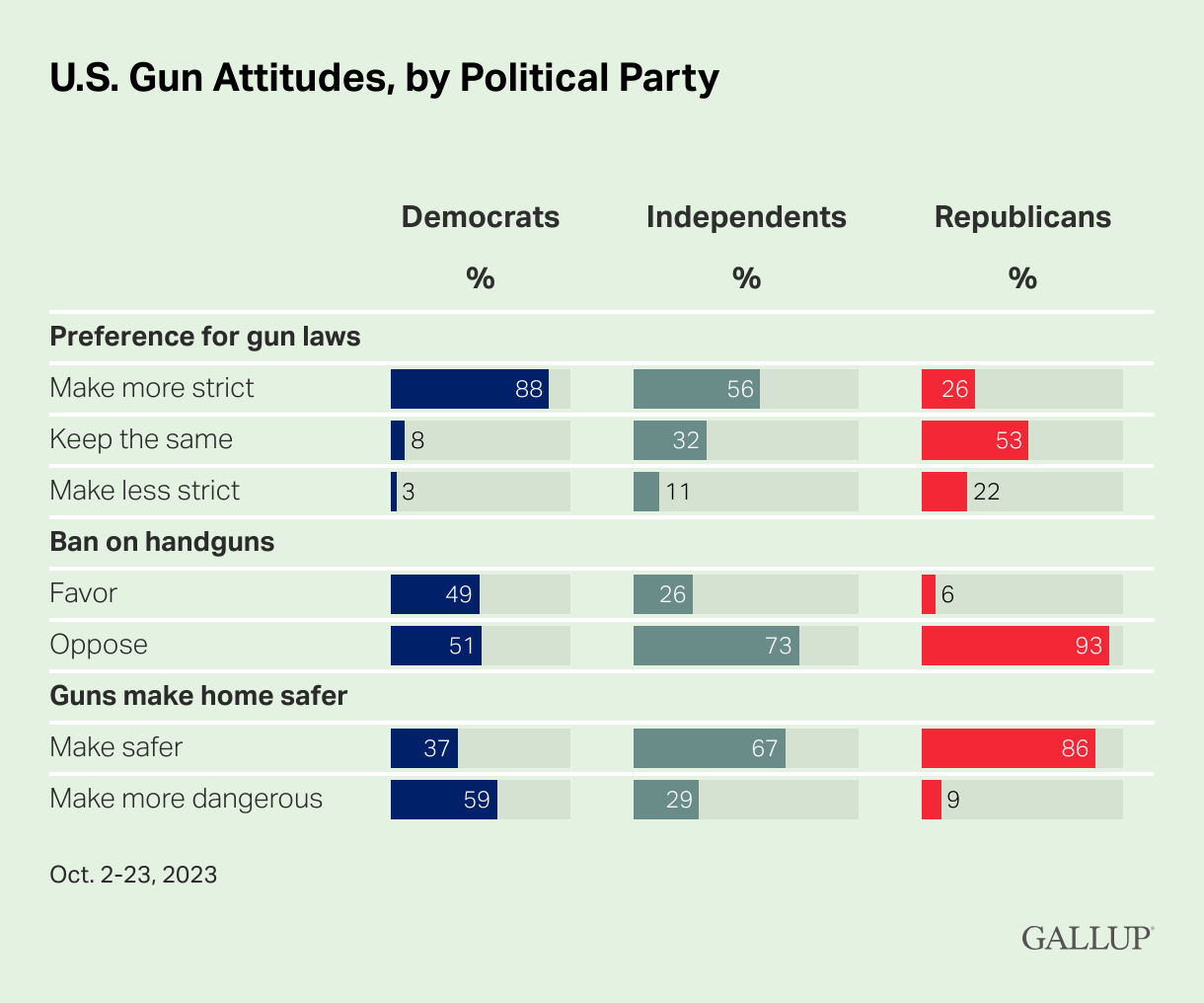
Moreover, Kansas City is both home to, or has connections to, some of the most longstanding, impactful and unique ways of addressing gun violence.
Moms Demand Action For Gun Sense In America is the largest, with chapters on both sides of the state line. Its founder, Shannon Watts, is a graduate of the University of Missouri-Columbia and worked for former Gov. Mel Carnahan.
Watts, who now lives in California, was among the first gun reform voices with a large platform to speak out after the Kansas City parade shooting. And she’s continued, nonstop.
Posting an overview photo of the rally, showing the masses of people attending the Chiefs parade, she wrote on X, formerly Twitter:
“The is the logical outcome of being awash in 500,000,000 million guns in a nation with too few gun laws. And it only changes when we all refuse to vote for any lawmaker – regardless of political party – who opposes gun safety.”
Watts’ 2019 book, “Fight Like A Mother,” reads like a handbook for forging impactful advocacy. A few of the chapter titles: “Losing Forward;” “Use Your Bullhorn;” “Tap into the Priceless Power of Volunteers;” “Be Seen;” “Know Your Numbers;” “Build a Big Tent;” and “Keep Going.”
For now, Kansas City remains in national spotlights, with some of the views being wildly inaccurate and racist.
Some, including elected officials and media pundits, issued pronouncements about the race and class of the shooters and mistook a man who had been briefly detained by police for the shooter. The false rhetoric claimed the man was an undocumented immigrant.
He’s an Olathe resident. He’s not an immigrant. And he wasn’t involved in the shootings.
Many wish to weigh into the melee.
There’s no exact blueprint for enacting change, whether it’s gun laws or people’s hearts.
Nor are there set rules for how to manage heated discussions, or the verbal attacks and threats that can come from speaking out, especially if you’re a woman or person of color.
But there are those locally who have trod these paths, as victims of gun crimes and as advocates.
They are mothers who have lost sons to gunshots and found a way to comfort other women. They are grandparents who use their retirement years to advocate for less access to guns, or safe gun ownership. Or a woman who stopped trying to convince Kansas lawmakers of her views, ran for office and got elected.
Some people focus on teaching children kindness and to not see immigrants as a danger. Others help workplaces deal with the trauma of employees. And still more work with programs seeking volunteers that can help educate and mentor children, so that guns and crime aren’t a choice that they’d make.
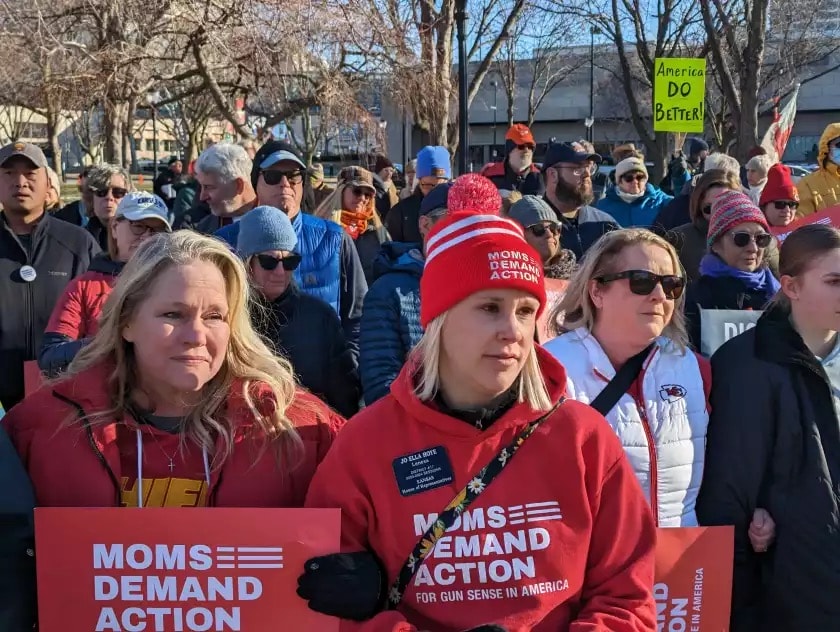
Three Woman: Three Responses to Gun Violence
Rosilyn Temple refused to attend this year’s Chiefs parade.
She went to last year’s celebration and was alarmed, fearful of the dynamics of a citywide parade, suspecting that many people might be augmenting their Chiefs’ spirit by also carrying a gun. It just didn’t feel safe to her.
Temple is the founder of KC Mothers in Charge, a 10-year-old organization that helps families with the trauma that follows a death from gun violence. She is summoned by detectives to every murder scene and begins working immediately with survivors, helping them to understand the investigative process and standing alongside them amid overwhelming grief.
Temple “stepped into my purpose” after the murder of her son in November 2011.
She hadn’t been able to reach Antonio “Pee Wee” Thompson and called Kansas City police for them to do a welfare check. They found his body.
“I needed another mother to be with me,” she said. “But there was nothing like Mothers in Charge then.”
She’s eager to connect with other mothers outside of her own African American community. And a vigil gathering that she hosted on Monday was among the most diverse of any organized since the parade shooting.
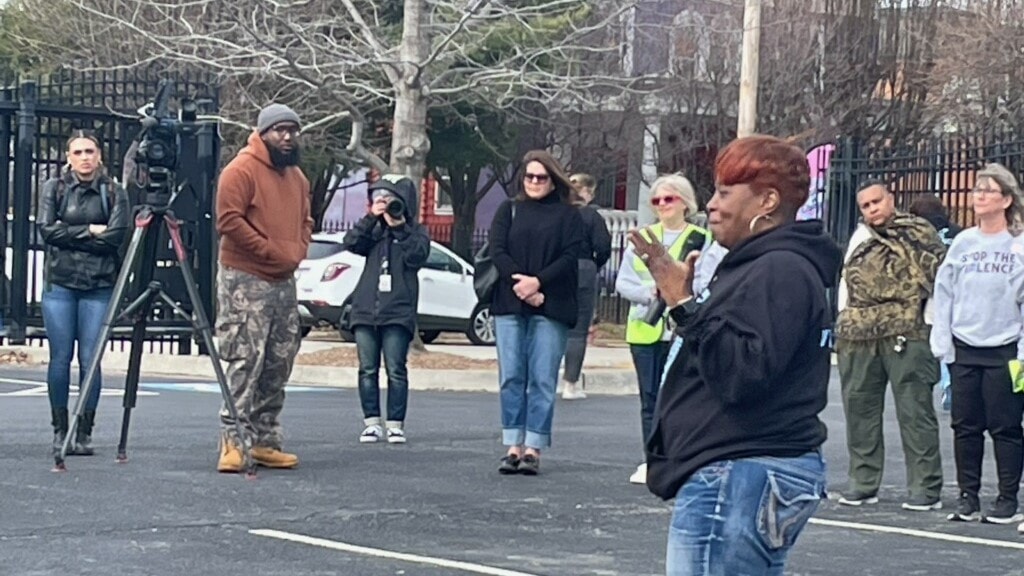
Christina Esteban is the managing director of Mother’s in Charge and has deep ties to the Latino community.
Lisa Lopez-Galvan, the woman killed at the rally, was a wife and mother, and a popular DJ of Tejano music in the Latino community.
The Lopez-Galvan family is many-layered, with dozens of cousins and extended family members, many already in advocacy roles in the Kansas City area and nationally. In time, after their initial grieving, some have expressed interest in becoming active, seeking solutions to the violence that took Lopez-Galvan’s life.
Mindy Corporon had joyously watched a live-streamed view of the parade on her television at her home in Florida. She’d switched the TV off but had left her computer on.
That’s how she heard the first breaking news bulletins, and she knew other families would soon know about the pain her family had lived with for almost 10 years.
In April 2014, a white supremacist staked out and targeted Johnson County’s Jewish Community Center and a nearby senior living center, Village Shalom. He wanted to murder Jews.
He killed Corporon’s 14-year-old son and father (United Methodists) and Terri LaManno, (Catholic) who was visiting her elderly mother.
In response, Corporon founded one of the area’s best-known advocacy groups. SevenDays works to increase kindness through knowledge, mindset and behavior.
Initially, she called the effort, Faith Always Wins. And she studied Judaism, because of the antisemitic rantings of the man who murdered her son and father, Reat Underwood and William Corporon.
It would be months before she realized the Kansas City area already had a well-established interfaith dialogue group.
Later, she began to focus more on youth and bolstering their efforts to know others different from themselves and to spread kindness.
“We teach kindness,” Corporon said. “And our mission statement is that we overcome hate by promoting kindness though education and dialogue.”
The goal is to bring programming to every school in metropolitan area by 2026. They are in 36 schools so far.
She’s also the co-founder of a for-profit effort, Workplace Healing, which seeks to strengthen the national and international corporate culture, restore productivity and increase re-engagement for a grieving employee.
Sunayana Dumala also learned of the Super Bowl parade shootings from her home in Florida.
She was already ill at ease, with it being Valentine’s Day, the last holiday she was able to celebrate with her husband in 2017.
Srinivas Kuchibhotla was shot and killed when a man screaming “get out of my country” entered an Olathe bar and shot the Garmin engineer and his friend, also an immigrant from India, and an engineer.
Thursday, Feb. 22, is the anniversary of when Dumala’s beloved husband died.
Her nonprofit, Forever Welcome, focuses on increasing awareness about immigrants and their positive contributions to the nation.
“The words “Get out of my Country” that the shooter yelled got me to immediately realize that Srinu’s murder was a result of the political rhetoric and the disinformation about immigrants,” Dumala said. “My immediate focus was to determine how to combat this misinformation and bring communities together.”
She also was featured in a documentary film that detailed the struggles of college-educated immigrants from India who are often trapped in more than 100-year backlogs within the immigration system.
Indian immigrants working through an H-1B visa currently have a wait for green cards. A green card denotes permanent legal status, which allows an immigrant to not depend on their employer to remain in the country.
Later this month, Dumala will return to Garmin to give a presentation called “Fostering Welcoming Communities Through Inclusive Dialogue.”
It’s a new effort, a part of Dumala’s Forever Welcome work, with an eye toward increasing cross-cultural understanding around issues of immigration.
“I was happy to see how the city rallied to give the message of oneness, kindness, and love,” Dumala said of the responses to the shooting. “My hope is that we continue to do that. Let’s find ways to volunteer with organizations trying to make a difference.”
Each of the women was shaken by the shootings last week. Each organization issued statements. And each is ready to be a part of Kansas City’s efforts to move forward.
Organizations You Can Join
Brenda Crenshaw approached those gathered to hold a vigil and asked: “Which of these ladies is the one with the grandparents group? The one that works against gun violence?”
She was quickly directed to a diminutive figure standing among the approximately 75 who gathered Monday.
The two women huddled.
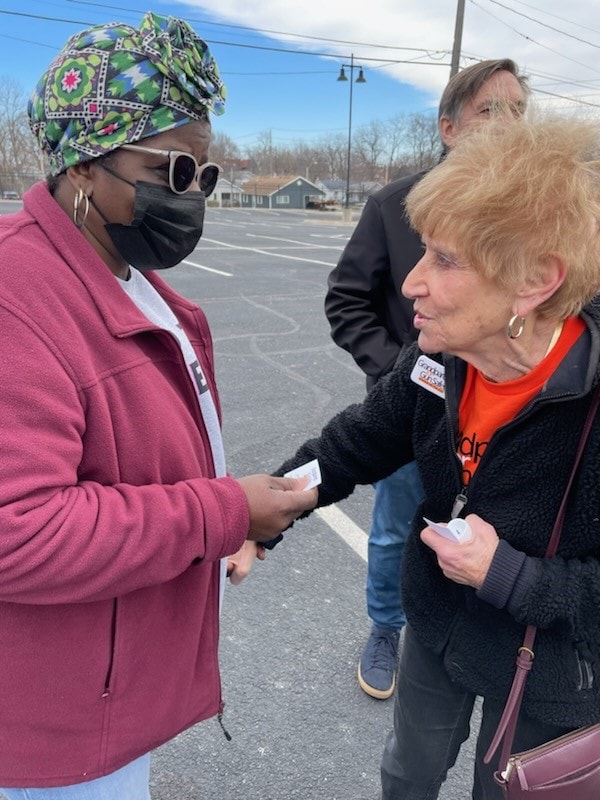
Judy Sherry gave Crenshaw a card with her contact information for Grandparents For Gun Safety KS/MO. The group has a meeting scheduled for 4 to 5:30 p.m., February 26 in the Social Hall of Colonial Church in Prairie Village, KS.
Sherry co-founded the group in 2013 after reading a column about the original group, organized by grandparents affected by the mass shooting that killed 20 children and six adults at Sandy Hook Elementary School.
Grandparents, the founders surmised, had more time, resources and, in cases like Sandy Hook, they were also one step removed from the trauma. Parents whose children had died, or were heavily affected by what they’d endured, were simply too busy helping their children recover.
Crenshaw understands that distance. She wants to help her daughter, whose only son was killed by gunfire on July 13, 2022. His murder, in Kansas City, has not been solved, she said.
Devin Cunningham was 19.
“He was in the wrong place at the wrong time,” she said.
The gunfire at the Chiefs parade, she said, “just hit so close to home.”
“To see those young kids run for cover,” Crenshaw said, her voice trailing. “It makes me want to step up to the plate.”
Sherry’s card safely tucked away, she then joined the others in a circle, where the victims of the parade shooting were remembered and calls for action were issued.
“It took a lot to come here today,” Crenshaw said. “But I’m glad that I did.”
Last week, a similar vigil was held, organized by KC Common Good.
The group hopes to address violence by looking at root causes. It’s closely aligned with KC 360, an effort modeled on similar work in Omaha.
In recent days, KC Common Good has emphasized that all are welcome at weekly meetings, held at 9 a.m. each Thursday at the Magis Activity Center at Rockhurst University.
Others who’ve spoken out since the shootings also called for one-on-one volunteerism.
Mark Clifton started the effort The Longest Night to remember murder victims.
“Everyone says it’s the parents. But where are those who help the parents who are struggling to raise children?” he said. “They need our help, not our judgment.”
It’s a message echoed by Corporon, who will soon embark on this year’s SevenDays events beginning April 10 with a Kindness Breakfast.
But she said that looking to organizations that already exist will be most helpful.
She added that mentoring children who might not have social and economic advantages is key.
“They should call up Operation Breakthrough and say: ‘When can I get there and read a book? How fast can I get to the Boys and Girls Club? And how can I teach swim lessons at the YMCA?’” Corporon said.
“I understand that people are angry and I’m angry too,” Corporon said of the shooting at the parade. “But look to the organizations that already exist. A lot of groups already have something good going on.”
Mary Sanchez is senior reporter for Kansas City PBS.



